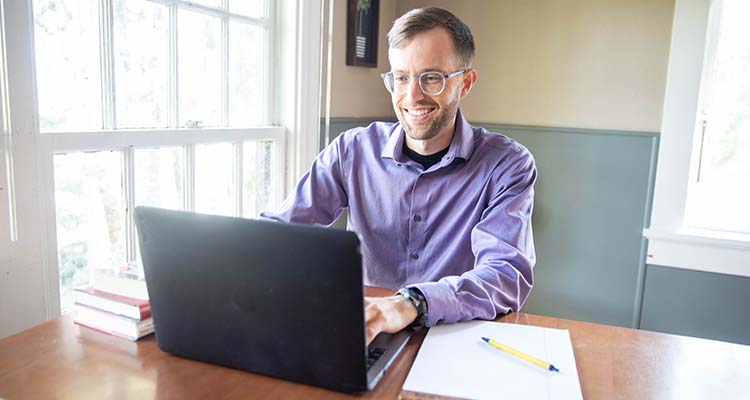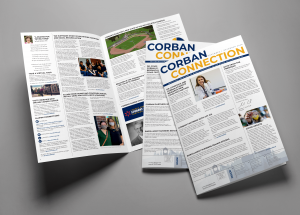Corban Hires Dr. Richard Weber to Spearhead New Online Learning Program as Vice Provost for Nontraditional Learning
“There are a lot of people who got a good start on a program and want to finish it, or who find themselves wanting to make a career change later in life,” says Corban’s new Vice Provost for Nontraditional Learning, Dr. Richard Weber.
After sixteen years of teaching theology courses at Moody Bible Institute, where he also helped to direct and expand their online program, Dr. Weber is excited to start this new initiative at Corban University, continuing to meet adult-learners where they are at by catering to their unique educational needs.
“Rich brings an understanding of the online world, and the capacity as a doer,” says Corban University Provost, Dr. Tom Cornman. “A lot of people can talk about the online world and their ideas related to it, but Rich brings that unique dynamic of being able to accomplish what we need to accomplish so that we’re actually providing quality online programming to students.”
Corban’s new online learning program is made possible in large part due to funding from the Murdock Family Foundation, who issued a three-year, $750,000 cascading grant to the University with the purpose of supporting and expediting the launch of this new offering to the educational landscape.
“The Murdock Foundation will not give you money unless they believe you have a good chance in succeeding,” Cornman says. “It’s a major vote of confidence, but also, without that initial start-up money, we wouldn’t have the capacity to launch this endeavor with the same intentionality and speed. We are now able to grow our online initiative to cover those initial costs and then eventually produce more income than is necessary to sustain the program.”
Even though the higher education industry and major grant providers like Murdock Foundation see the demand for online and nontraditional education rising, Weber still sees an unnecessary stigma when compared to traditional modes of learning. “A lot of people think online education is inferior, that the only kind of teaching should happen face-to-face,” he says. “I like to remind people about Paul providing a lot of his teaching through letters. That wasn’t face-to-face either. It’s what we would call distance learning and it seemed to work pretty well.”
With a shift in the landscape of higher education, excess funds from nontraditional programs have become a necessity, supporting the crucial work done in the sphere of traditional undergraduate education. “With high school graduation rates declining, we are probably not going to see huge amounts of growth in traditional undergraduate program,” says Cornman. “We are likely going to see students who have gone to college but never completed their degree and want an education that is based upon biblical integration. We can help them grow in their faith and help them be better Christians in the marketplace.”
For Weber, the extension of Corban’s mission to educate Christians to be competent and compassionate professionals in the marketplace reaches an exciting new audience with the online learning program, packaged with its own unique challenges and requiring a distinct and innovative focus. “Once you get out of those college years where you still have a lot of freedom with your time, and find yourself with a job, or family, or other circumstances, it’s very hard to try and reengage in a classroom,” he says. “Whether our students are pastors who can’t just pack up and leave their church and go back to school or are at a stage in life where they can’t just leave their family and jobs, we structure out programs in a way that engages the adult learner where they are and how they think.”
Currently the program offers three courses of study to adult learners: Psychology, Business, and Interdisciplinary study. Through the funding of the Murdock Foundation, plans to expand these course offerings have been expedited. “We anticipate rolling out new courses for the first time in the second session of the spring semester,” Cornman says. “We will continually be revising, expanding, and building our program offerings to make sure we are providing courses that are most attractive to the adult learner.”
As Weber prepares to expand and diversify the ways in which Corban can train and equip individuals to make a difference in the world for Jesus Christ, his focus is aimed towards their futures. “The idea of a Bible-based education does not necessarily mean seminary for everyone,” he says. “It doesn’t mean going to your office and singing hymns all day, or being a math teacher and preaching a sermon, it means living as a faithful follower of Christ in the vocation that you’re called to. We want to help people know how to get out and make a difference in their called professions in a way that will glorify God, regardless of their age, stage in life, or career.”


